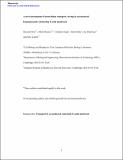A novel mechanism of intracellular transport: sieving by an anchored homogeneously contracting F-actin meshwork
Author(s)
Mori, Masashi; Monnier, Nilah; Daigle, Nathalie; Bathe, Mark; Ellenberg, Jan; Lenart, Peter; ... Show more Show less
DownloadCB Final Revision.pdf (2.623Mb)
OPEN_ACCESS_POLICY
Open Access Policy
Creative Commons Attribution-Noncommercial-Share Alike
Alternative title
Intracellular Transport by an Anchored Homogeneously Contracting F-Actin Meshwork
Terms of use
Metadata
Show full item recordAbstract
Summary
Actin-based contractility orchestrates changes in cell shape underlying cellular functions ranging from division to migration and wound healing [ [1], [2], [3], [4] and [5]]. Actin also functions in intracellular transport, with the prevailing view that filamentous actin (F-actin) cables serve as tracks for motor-driven transport of cargo [ [1] and [6]]. We recently discovered an alternate mode of intracellular transport in starfish oocytes involving a contractile F-actin meshwork that mediates chromosome congression [7]. The mechanisms by which this meshwork contracts and translates its contractile activity into directional transport of chromosomes remained open questions. Here, we use live-cell imaging with quantitative analysis of chromosome trajectories and meshwork velocities to show that the 3D F-actin meshwork contracts homogeneously and isotropically throughout the nuclear space. Centrifugation experiments reveal that this homogeneous contraction is translated into asymmetric, directional transport by mechanical anchoring of the meshwork to the cell cortex. Finally, by injecting inert particles of different sizes, we show that this directional transport activity is size-selective and transduced to chromosomal cargo at least in part by steric trapping or “sieving.” Taken together, these results reveal mechanistic design principles of a novel and potentially versatile mode of intracellular transport based on sieving by an anchored homogeneously contracting F-actin meshwork.
Date issued
2011-04Department
Massachusetts Institute of Technology. Department of Biological EngineeringJournal
Current Biology
Publisher
Elsevier Ltd.
Citation
Mori, Masashi et al. “Intracellular Transport by an Anchored Homogeneously Contracting F-Actin Meshwork.” Current Biology 21.7 (2011): 606-611.
Version: Author's final manuscript
ISSN
0960-9822